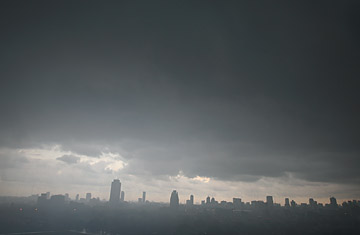
Rain clouds fill the sky over Bangkok, Thailand, 01 July 2011.

This post is in partnership with Worldcrunch, a new global-news site that translates stories of note in foreign languages into English. The article below was originally published in Le Monde
BANGKOK — Day after day, Bangkok sinks. Inexorably. The most pessimistic experts are afraid part of Thailand's capital will be submerged by 2030. Specialists complain about the absence of any policy in place to prevent a disaster that seems bound to occur.
This looming natural disaster risk will be a central challenge for the new government arriving after the July 3 elections. Climate change, rising sea level, coastal erosion: a variety of converging factors could lead to the end of the biggest city of the Chao Praya river delta, originally built up after a commitment on April 21, 1782 by the first sovereign of the Chakri dynasty. The family still reigns today.
The city continues to multiply demographically: some 10 million people now live in the center or in the suburbs of this megalopolis. Even the weight of the skyscrapers contributes to the progressive engulfing of Bangkok. The soils descend from 1.5 to 5.3 cm each year, and a big part of the megalopolis is already under sea level.
Sooner or later, the rising sea level will threaten more that 1 million buildings, 90% of which are residential. In the Samunt Prakan harbor, about 15 kilometers away from Bangkok, the suburban houses along the river are already flooded certain months of the year. In a report published by the World Bank, the Asian Development Bank and the Japan International Cooperation Agency, Bangkok appears on the list of the cities threatened by climate change.
Jan Bojo, a World Bank expert in the Thai capital, says one of the reasons Bangkok is sinking is the abusive pumping of ground waters. But even if they all agree that the situation will get worse within the next few years, experts differ on the causes. Smith Dharmasaroja, head of the National Center for the Prevention of Natural Disasters, predicts that in 2100, Bangkok will have become a new "Atlantis." This meteorologist's analysis, as pessimistic as it may sound, is considered credible. In the 1990s he correctly forecast the devastating December 2004 tsunami.
Mr Dharmasaroja claims that the government "has taken no decision yet" to stop the phenomenon. "If nothing is done, Bangkok could be entirely flooded by 2030." One solution he proposed consists in building a huge series of sea walls along the Siam gulf, a project that would cost about 2 billion euros.
Anond Snidyongs, an oceanographer specialized in the impact of climate change in Southeast Asia, is more cautious. He says that: "no one can predict how long it will take for Bangkok to be flooded and how the process will evolve."
Snidyongs thinks the construction of sea walls would be useless. "It is no use trying to prevent coastal erosion from happening. The shore diminishes 3 to 4 cm each year: it's hopeless," says the scientist. "On the other hand, there are many other ways to fight the floods, like, for example, better management of urban building land."
Niramon Kulsrisombat is a town planner and teacher at the architecture department of the prestigious University of Chulalongkorn. She confirms that "floods have always been a natural phenomenon considering that Bangkok is built on muddy soils, only 1.5 meters above sea level."
But before, many "khlongs" (irrigation canals), vegetable gardens and fields absorbed the floods. During the recent urbanization process, many buildings have been built on lands that used to allow the water to drain.
Anond Snidvongs believes the coordination of the different measures will be key to protecting the city: "We must absolutely reach a consensus so that the millions of people who, sooner or later, will be directly affected by the floods, agree on the solutions. This issue is not exclusively a question of techniques or money. We also need the specialists to get their story straight, and to give precise figures that would help imagine what the future might look like."
They can only hope that it is a future where Bangkok is not destined to be the next Atlantis.
Also from Worldcrunch:
Amsterdam Decides It's High Time To Squash Its Squatters
— Le Monde
Nigeria's 'Nollywood' — Where African Celluloid Dreams Roll Out Fast And Furious
— Die Welt
Why The Survival of The Great Hamster of Alsace Is About More Than Naughty Little Rodents
— Le Temps
